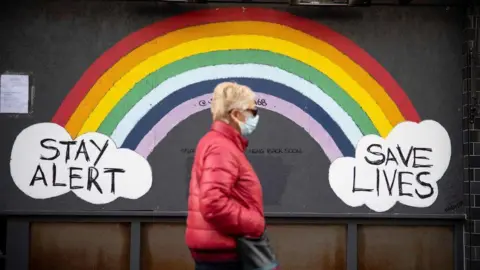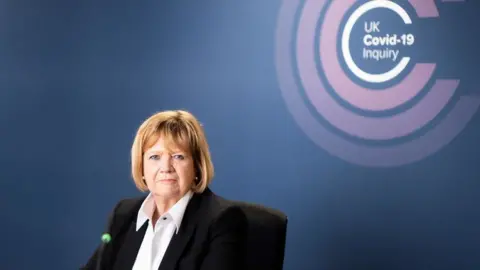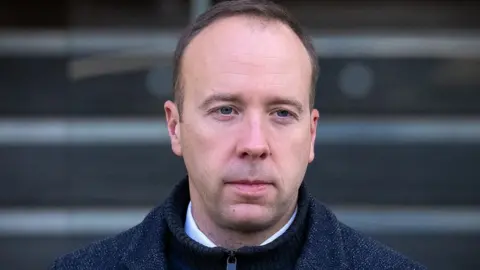 Getty Images
Getty ImagesThe Covid Inquiry’s second report, into political decisions during the pandemic, will be published on Thursday.
In July 2024, the inquiry’s first report said the UK’s flawed preparations had led to more deaths and greater economic damage than there should have been.
Just under 227,000 people died in the UK from Covid between March 2020 and May 2023, when the World Health Organization said the “global health emergency” was over.
What is the Covid public inquiry and when did it start?
Former UK Prime Minister Boris Johnson launched the Covid inquiry in June 2022, more than a year after he said the government’s actions during the pandemic would be put “under the microscope”.
The announcement came after the Covid-19 Bereaved Families for Justice campaign group said it was considering launching a judicial review over government “time-wasting”.
The inquiry covers decision-making by the UK government, as well as the administrations in Scotland, Wales and Northern Ireland.
The first public hearings took place in London in June 2023. There have also been hearings in Edinburgh, Cardiff and Belfast.
Public inquiries are established and funded by the government and are led by an independent chair. They can compel witnesses to give evidence.
No-one is found guilty or innocent, but an inquiry publishes conclusions and recommendations, which the government is not obliged to accept.
The Covid inquiry’s chair is former judge and crossbench peer Baroness Hallett, who previously led the inquests into the 7 July London bombings.
She said that loss and suffering would be at the heart of the inquiry, and that it would be “firmly independent”.
 Piranha Photography
Piranha PhotographyWhat is the inquiry looking at?
The inquiry is split into different parts.
Work on the first two modules – resilience and preparedness; and decision-making and political governance – has finished.
The inquiry is still investigating other aspects of the pandemic:
- the impact on healthcare systems across the UK
- vaccines, therapeutics and anti-viral treatment
- government procurement and PPE
- the care sector
- test-and-trace
- the impact on children and young people
- the government’s business and financial responses
- the impact on society
The final public hearings are due to begin in February 2026.
The inquiry will publish several reports, including the conclusions of each module.
Scotland is holding a separate inquiry into the pandemic.
What does the second Covid inquiry report look at?
The second report covers how politicians and civil servants responded to the pandemic.
In particular, it will consider the timing and effectiveness of the approach to lockdown and the closure of businesses and schools.
“Did the government serve the people well, or did it fail them?” asked the inquiry’s lead counsel Hugo Keith KC at the start of this module in 2023.
More than 7,000 documents from the time have been made public, including WhatsApp chats and emails, private diaries and confidential files.
What did the Covid inquiry’s first report say?
The first report, into resilience and preparedness, was published in July 2024.
In it, Baroness Hallett said the UK had been “ill-prepared for dealing with a catastrophic emergency, let alone the coronavirus pandemic”.
“Never again can a disease be allowed to lead to so many deaths and so much suffering,” she added.
The 217-page report argued the UK planned for the wrong pandemic – a mild one where spread of a new virus was inevitable – and this led to the “untested” policy of lockdown.
It said the UK government and devolved nations “failed their citizens”, and that ministers did not sufficiently challenge scientific experts.
It made recommendations for reforming the way the government approaches emergency planning.
Who has given evidence to the inquiry?
The inquiry has heard from hundreds of witnesses. They include current and former politicians, civil servants, government advisers, public health experts and representatives of bereaved families.
Many were extremely critical of Johnson, who was prime minister throughout the pandemic.
He began his first evidence session in December 2023 by apologising for the “pain and the loss and the suffering” during the pandemic.
Johnson admitted mistakes were made and that “there were unquestionably things we should have done differently”, but insisted that ministers had done their “level best” in difficult circumstances.
Former Prime Minister Rishi Sunak gave evidence about his role as chancellor during Covid.
He also apologised to “all those who suffered… as a result of the actions that were taken”, but denied his Eat Out to Help Out Scheme had increased infections and deaths.
 HM Treasury
HM TreasuryThe government’s chief medical officer, Prof Sir Chris Whitty, and former chief scientific adviser Sir Patrick Vallance, previously told the inquiry that they had not been consulted about the policy.
Sir Patrick, Sir Chris and his former deputy Prof Sir Jonathan Van-Tam also said they had received substantial abuse from the public while carrying out their roles.
 Getty Images
Getty ImagesFormer Health Secretary Matt Hancock has given evidence several times.
He told the inquiry that the UK’s pandemic strategy had been completely wrong, while admitting the UK should have locked down much sooner.
Hancock also criticised the “toxic culture” in government, for which he blamed Johnson’s former adviser Dominic Cummings.
In his evidence to the inquiry, Mr Cummings described a “dysfunctional” government and was very critical of Johnson’s approach.
The hearing also discussed scathing text messages he sent, many of which contained offensive descriptions of ministers and officials.
Mr Cummings said he regretted the handling of his infamous trip to Barnard Castle during the first lockdown, but denied that he had damaged public trust in the government.
The inquiry has also heard from Scottish, Welsh and Northern Irish political leaders, including:
- former Scottish First Ministers Nicola Sturgeon and Humza Yousaf
- former Welsh First Minister Mark Drakeford
- current Northern Irish First Minister Michelle O’Neill and former First Minister Baroness Foster
How can the public get involved in the Covid inquiry?
#Covid #inquiry #work



